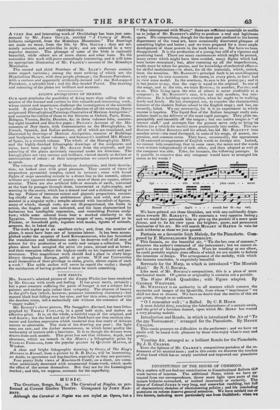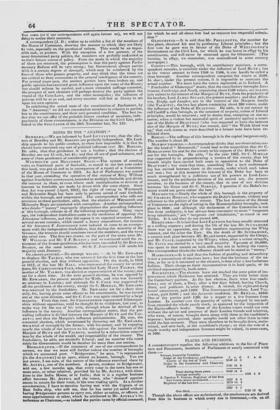CONSTITUTION OF THE HOUSE OF COMMONS.
Oust readers will not find our contribution to Constitutional Reform this week barren of interest. The additional Notes, which we have er tracted from our correspondence, throw more light upon parts of the system hitherto untouched, or noticed incorrectly or cursorily. The letter of Colonel JONES iS very long, and somewhat rambling, but full of characteristic sketches of electioneering polities; and Ins concluding questions on reform deserve general attention. We have mislaid one or two letters, including more particularly one from Guildford; when we
fine them (or if our correspondents will again favour us), we will not delay to notice their contents. .
A correspondent (J. D.) wishes us to exhibit a list of the members of the House of Commons showing the manner in which they are likely to vote, especially on the question of reform. This would be an impos- sible task, at present. With the exception of a few . persons, of the most determined party politics, the members are probably undecided as to their future course of policy. From the mode in which the majority of them are returned, the presumption is that the party against Parlia- mentary Reform will be very strong ; but Government always carries with it a certain degree of strength, which may be reinforced by the fears of those who possess property, and may think that the times are *too critical to. deny concessions to the general: intelligence of the country. For several years past, the ancient parties have been broken up, and public opinion hasexercised great influence upon the votes of the House; but should reform be carried, and a more extended suffrage conceded, the prospect of new elections will perhaps destroy the party against the repeal of the Corn-Laws, and the other monopolies : the influence of Patrons Will be at an end, and every member will feel at liberty to act -upon his own opinion. • In exhibiting the actual state of the constitution of Parliament, by the "Anatomy," we did not contemplate members in relation to parties, but to the constituency, and their own personal condition. The best in- dex that we can offer of the probable future conduct of members, inde- pendently of those circumstances, is the Division on the Civil List, pub- lished in the SPECTATOR of the 20th November last, No: 125.



























 Previous page
Previous page